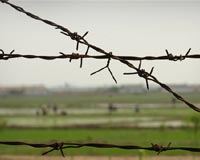| . |  |
. |
Beijing (AFP) May 28, 2009 China has long been the main ally of North Korea, but as it assumes a greater role in international affairs, Beijing will find it more difficult to defend the isolated regime, analysts say. North Korea's nuclear test this week and its threat to attack US and South Korean ships has infuriated the international community, which leaves China with less room to stand by Pyongyang's side, they say. And that could mean dire consequences for Kim Jong Il's regime -- possibly including new UN sanctions on the North and a severe cut in trade and assistance from the one nation that keeps it afloat. "China will have to support another... UN Security Council resolution undeniably or risk total isolation," said Georgetown University's Victor Cha, a former Asian Affairs director at the US National Security Council. As one of the permanent members of the UN Security Council, China wields veto power and can block any attempt to impose new sanctions against the North. But as host of the six-party international disarmament talks that have repeatedly failed to bring North Korea to heel and seem at least temporarily finished, China has seen its influence over the North waning. Jia Qingguo, dean at Peking University's School of International Studies, said that if the North refuses to return to those talks, China may well decide to let more UN sanctions be imposed. "It depends on whether North Korea returns to the six-party mechanism," Jia said. "If it does not return, then China can support UN sanctions. It won't be a matter of half a year. It must happen within one or two weeks." China has always favoured cautious diplomacy with North Korea, wary of any moves that could push the regime to collapse and potentially send millions of North Korean refugees streaming over the border. But increasingly it appears that diplomacy is not working. Since the disarmament talks began six years ago, North Korea has conducted two nuclear tests, fired off rockets and missiles and threatened to attack South Korea. One sign of Beijing's growing impatience may be the coverage of the North's latest nuclear test in the country's state-run media, which has sometimes been shockingly harsh in its tone. "There is no need for China to maintain its past policy toward its trouble-making neighbour any longer," Sun Zhe, an expert on Sino-US ties at Beijing's Tsinghua University, was quoted as saying in the Global Times paper. "The Chinese government should teach (North Korea) a lesson." Some analysts believe the most likely way to do that would be through trade. North Korea is one of the world's poorest countries -- the CIA ranks it 192nd in terms of per capita GDP -- and China accounts for almost three-quarters of its foreign trade. Much of the North's imports, moreover, depends on loans from Beijing. "If the situation continues to deteriorate, I think China will reduce trade with North Korea," said Shi Yinhong, director of the Center For American Studies at People's University. Georgetown's Cha said China can meanwhile use private ways of trying to bring North Korea around, citing close links between their militaries and their respective Communist parties. "The type of sanctions China needs to exert are not seen in public trade figures but in the unseen party-party and military-military relationships," he said. "China can do many things through these channels that are effective."
Share This Article With Planet Earth
Related Links Learn about nuclear weapons doctrine and defense at SpaceWar.com Learn about missile defense at SpaceWar.com All about missiles at SpaceWar.com Learn about the Superpowers of the 21st Century at SpaceWar.com
 NKorean refugees say food more important than nukes
NKorean refugees say food more important than nukesAnseong, South Korea (AFP) May 28, 2009 North Korea hailed its latest nuclear test as an inspiration to its people, but refugees fleeing the impoverished state say the money should be used to feed the hungry instead. "When North Korea conducted the first nuclear test, I took great pride in it. I felt my country was so powerful then," said a 35-year-old defector at a South Korean resettlement centre southeast of Seoul. "I heard ... read more |
|
| The content herein, unless otherwise known to be public domain, are Copyright 1995-2009 - SpaceDaily. AFP and UPI Wire Stories are copyright Agence France-Presse and United Press International. ESA Portal Reports are copyright European Space Agency. All NASA sourced material is public domain. Additional copyrights may apply in whole or part to other bona fide parties. Advertising does not imply endorsement,agreement or approval of any opinions, statements or information provided by SpaceDaily on any Web page published or hosted by SpaceDaily. Privacy Statement |